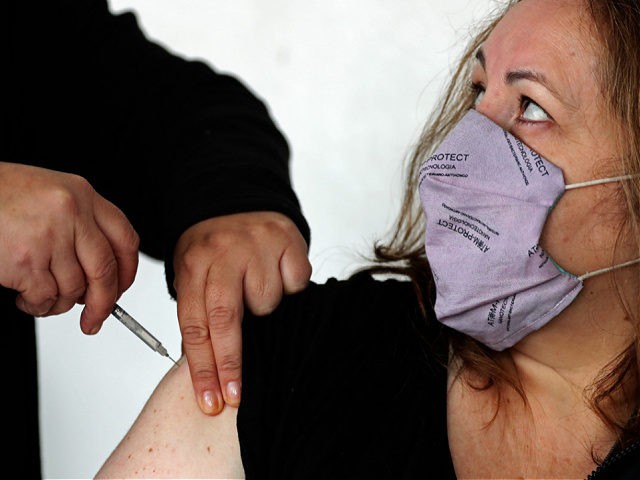Argentina’s government imposed a nearly nationwide lockdown on Saturday to curb the country’s Chinese coronavirus caseload, which has spiked in recent days despite Argentina’s efforts to vaccinate its citizens against the virus using the Russian-developed Sputnik V vaccine candidate.
The socialist government of Argentine President Alberto Fernández ordered Argentina into total lockdown on May 22. The mandate is expected to last through May 31 and followed by another nationwide lockdown slated for the weekend of June 5-6.
“We are living the worst moment since the pandemic began,” President Fernández said on May 20 when announcing the new lockdown measure. “Today as never before, we must all take care of ourselves to avoid all the losses that we can.”
Argentina’s total lockdown order shuts down all non-essential businesses, suspends in-person learning at schools, bans people from leaving their home outside of a 6:00 a.m.-6:00 p.m. window, and prohibits people from venturing beyond the immediate vicinity of their residence, even for essential outings to grocery stores. Supermarkets are allowed to remain open during the lockdown, but restaurants may only operate home delivery and take-out services. All social, religious, and sporting events are banned under the order. Argentina’s leftist government has encouraged citizens to tell the government if they see their neighbors or anyone else violating the new evening curfew or gathering with other people.
Argentine health authorities reported 24,801 new cases of the Chinese coronavirus on May 23, along with 375 new deaths from the disease. The numbers are lower than those in the period immediately before the lockdown. Argentina on May 18 recorded 744 deaths from the Chinese coronavirus and reported 39,652 new cases of the disease on May 19.
Fernández told reporters on Monday he was “satisfied” with the first 48 hours of the ten-day lockdown, noting government figures so far “indicate a sharp decrease in traffic on public roads” throughout Argentina.
“[H]e also acknowledged that it is too early to draw conclusions on the matter and he conveyed caution to his work team,” the Argentine news site Infobae reported on May 24.
“Relative to its population of 45 million, those are some of the highest daily rates in the world,” the German broadcaster Deutsche Welle (DW) noted of Argentina’s caseload last week.
“The rapid surge has strained gravediggers, who are threatening to strike if they are not vaccinated against COVID-19 [Chinese coronavirus] soon,” DW reported on May 21.
Argentina was one of the first countries in Latin America to launch a Chinese coronavirus vaccination campaign, offering its citizens doses of the Russian-developed Sputnik V vaccine candidate on December 29, 2020.
The Sputnik V vaccine candidates sent to Argentina represented Russia’s first major international shipment of the shots to a foreign country, aside from Belarus. The first shipment of Sputnik V arrived in Argentina in December 2020 and “consisted only of the first dose of the two-shot vaccine, which is easier to make than the second dose,” Reuters reported at the time.
“Russian and Argentine officials did not immediately comment on when the second dose might arrive. [Russian] President Vladimir Putin has referred to a single-component option as a ‘light-vaccine’, which he said would provide less protection than the two components, but ‘will still reach 85 percent’ effectiveness,” according to the news agency.
In addition to Sputnik V, Argentina also approved for emergency use Chinese coronavirus vaccines manufactured by the U.S. multinational pharmaceutical company Pfizer, the German biotech company BioNTech, and the British-Swedish pharmaceutical multinational company AstraZeneca.
Despite Argentina’s headstart in launching its coronavirus vaccine campaign, the country’s rollout of inoculations has lagged in recent months due to “delays in vaccine arrivals,” according to DW.
“So far, only 4.7 percent of the population has been fully inoculated, while 18.5 percent have had their first shot,” DW reported on May 21, citing data from Argentina’s health ministry.

COMMENTS
Please let us know if you're having issues with commenting.